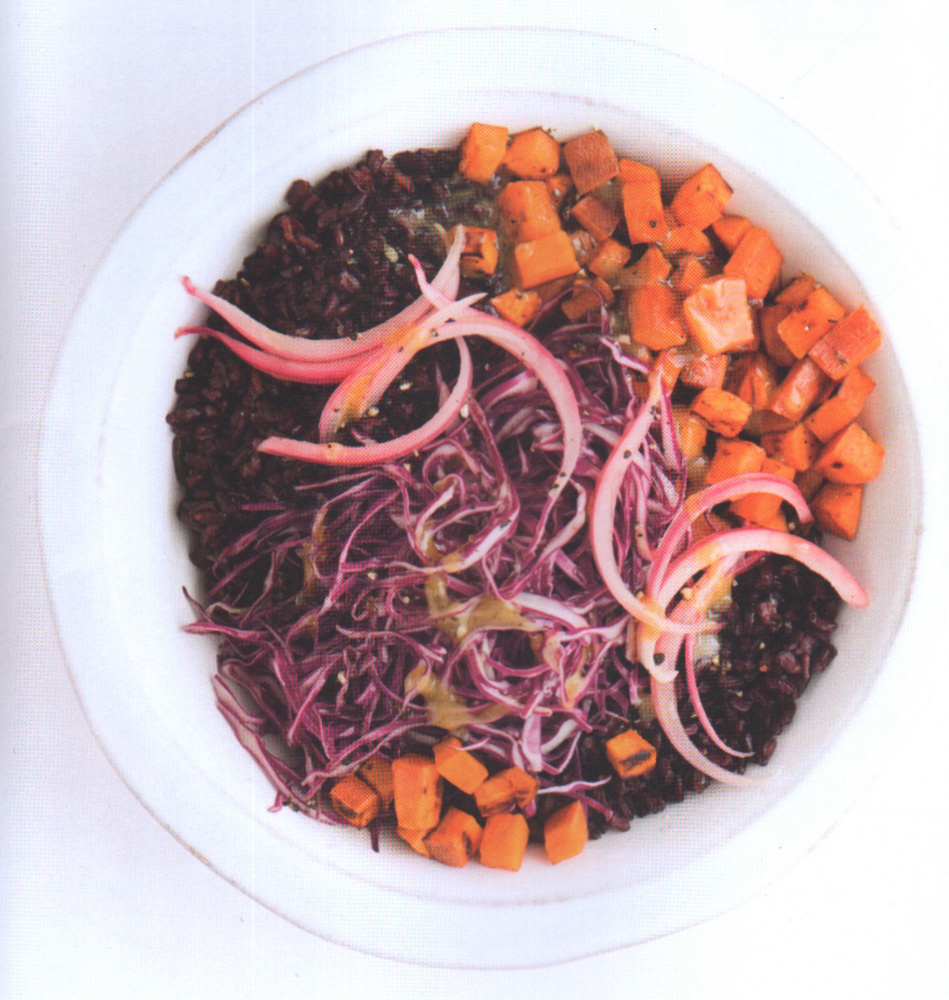“Grain Bowls: Bulgur Wheat, Quinoa, Barley, Rice, Spelt and More.” By Anna Shillinglaw Hampton. Photography by Victoria Walls Harris. Hardie Grant Books. Paperback. $19.99.
“Grain Bowls: Bulgur Wheat, Quinoa, Barley, Rice, Spelt and more,” a new cookbook by Anna Shillinglaw Hampton, makes you feel healthy just by reading the recipes. That wholesome, healthful feeling is furthered by the photos that accompany each recipe. Shot by Victoria Wall Harris, the photographs show the separate ingredients on the lefthand side of the page followed by the finished grain bowl on the right.
A grain bowl, Shillinglaw writes, is a convenient way to make ancient grains a part of modern-day diets. By combining whole grains with vegetables, fruit, meat or seafood, and topping the bowls with dressings or sauces, grain bowls can be complete nutritious meals.
The cookbook is divided into four sections: salad grain bowls, vegetarian grain bowls, meaty grain bowls and dressings and toppings. Every recipe serves two and almost all of them give a time of 15 minutes at the top of the page. In a quick glance, the reader might think the grain bowls can be whipped together in 15 minutes. Don’t be fooled. Actually, the recipes all call for cooked ingredients. The 15 minutes time refers to the assembly of those pre-cooked foods.
The front of “Grain Bowls” provides cooking times and tips for the different types of grains. My son Henry chose the Sweet Potato & Black Rice vegetarian bowl for us to try because of its colorful presentation. The rice, sweet potatoes and pickled red onions in the bowl each needs at least 30 minutes to cook, or in the case of the last, to brine. Making the Dijon dressing and slicing red cabbage are additional steps in preparing this meal. Also, heads up: Shillinglaw, who is British, gives the ingredients measurements in grams (with conversions to ounces, not cups, in parentheses). Still, it was worth the time as this grain bowl made for a delicious meal. The crispy red cabbage combined with the nutty black rice, the creamy roasted sweet potatoes and the tangy pickled red onions created a mouthful of distinct yet complementary flavors.
In addition to the nutritional benefits that come with eating more grains, they’re also economical. The variations and combinations for grain bowls seems endless in this collection of recipes; the range of low-cost meals is a bonus.
“Grain Bowls” promotes good quality, healthy food. Bear in mind that the key to using these recipes is advance preparation, but as most cooks know, good food is worth the planning and effort.
— ANGELA KING-HORNE
SWEET POTATO & BLACK RICE BOWL
I doubled the recipe to make enough dinner for a family of 4.
Serves 2
120 g (4 oz) red cabbage, finely sliced
2-3 tablespoons Dijon Dressing (see recipe)
Pinch of salt
250 g (9 oz) cooked black rice (100 g/ 31/2 oz uncooked)
250 g (9 oz) sweet potatoes, diced and roasted
15 g (1/2 oz) Pickled Red Onions (see recipe)
Freshly ground pepper
Toss the cabbage with 1 tablespoon of the dressing and the salt. Massage the dressing and salt into the cabbage to tenderise. Divide the black rice, sweet potatoes and cabbage evenly between 2 bowls. Top with Pickled Red Onions and drizzle with the remaining dressing. Season with black pepper.
DIJON DRESSING
Makes 150 ml (5 fl oz)
1 tablespoon honey
1 tablespoon Dijon mustard
1 tablespoon lemon juice
125 ml (4 fl oz) olive oil
Sea salt and freshly ground pepper
Whisk the honey, mustard and lemon juice together in a bowl until smooth. While whisking, slowly add the oil until the dressing comes together. Season to taste with salt and pepper.
PICKLED RED ONIONS
Makes 400 ml (13 fl oz)
230 ml (8 fl oz) apple cider vinegar
2 teaspoons sea salt
1 bay leaf
11/2 tablespoons granulated (raw) sugar
1/2 teaspoon black peppercorns
1 large red onion, finely chopped
Heat the vinegar, salt, bay leaf and sugar in a pan over medium heat, stirring until dissolved. Add the peppercorns. Put the onions in a 400 ml (13 fl oz) jar and pour the hot pickling liquid over the top. Let chill for 30 minutes, then store in the refrigerator for up to 1 week.
Send questions/comments to the editors.




Comments are no longer available on this story